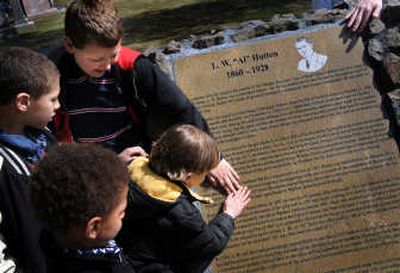Gravesite monument memorializes Huttons

May and Levi Hutton were pioneers in Spokane who left a legacgy still in full force today.
A memorial to the couple and the Hutton Settlement, has been set up by the Spokane Police Department History Book Committee, the Fairmount Memorial Association and the Spokane Law Enforcement Museum, at the site of the Huttons’ graves in Fairmount Memorial Park. The images of the couple and their stories are carved in the stone monument, and between the two stories is the image and story of the Hutton Settlement.
It’s the first double memorial the groups have erected in locations throughout Fairmont, Riverside Memorial Park and Greenwood Memorial Terrace. Other monuments honor pioneers including Mary Latham, Spokane’s first female doctor, Francis Cook, the publisher of the first newspaper in Spokane, and Eugene Hyde, the city’s first chief of police. The groups plan to eventually create a walking tour of the city’s history.
May Hutton was born in Ohio in 1860 to an unmarried woman and a man who was married with four children. Her mother either died or abandoned her and her father later sent her to live and take care of her blind grandfather when she was 9.
“I would have liked to have been a friend of hers,” Sue Walker, the chair of the Spokane Police Department History Book Committee, told a crowd of Hutton Settlement children and other residents at the dedication April 3.
Levi Hutton’s father died when Levi was 1 month old in 1860 and his mother died when he was 7. He and his six brothers and sisters were separated and sent to live with relatives throughout the country.
Losing their parents at such a young age had a profound affect on the couple, who later opened the Hutton Settlement, 9907 E. Wellesley Ave., a residential home for children ages 5 through 18.
The two met in the Coeur d’Alene Mining District where May operated a boarding house. She was known as the best cook in the area and Levi became a regular customer.
Levi Hutton, who preferred to go by his initials, L.W. or by “Al,” made his money after investing in the Mighty Hercules mine in North Idaho in 1901. wealth made it possible for to the couple to help others.
May fought for women’s right to vote in Idaho and ran for the Idaho Legislature in 1904. When the two moved to Spokane in 1907, May became heavily involved in women’s suffrage. It is believed that in 1910 she was the first woman to register to vote in Spokane County.
Although May died of the kidney condition Bright’s disease in 1915 at 55, L.W. continued their philanthropic work and announced plans to build the Hutton Settlement, which could house 80 children on 320 acres. The children’s home opened in 1919.
When Duane Broyles, president of the Fairmount Memorial Association, began working at the cemetery, he immediately chose the Hutton monument as his favorite. The coral-colored monument is half rough-hewn, half-finished carvings, and was L.W.’s tribute to his wife’s half-finished life.
Broyles said he was featured in a newspaper story in 1993 and chose the spot of the Hutton memorial to have his picture taken. The story put him in touch with local historians, including Tony and Suzanne Bamonte. The small group ultimately erected a monument on an area in Greenwood where several unmarked graves lay – the victims of an explosion in early Spokane on the corner of Sprague Avenue and Division Street.
The project led to more memorials and Broyles said he has come full circle, now that they are honoring the Huttons.
Broyles noted that most headstones in cemeteries include a name, a birth date, a dash and a death date.
“The dash tells you nothing about the people,” he said.
At the dedication, Suzanne Bamonte read the story of May, Broyles read the story of L.W., who died in 1928, and Emily Sue Pike, a retired teacher, read the story of Hutton Settlement.